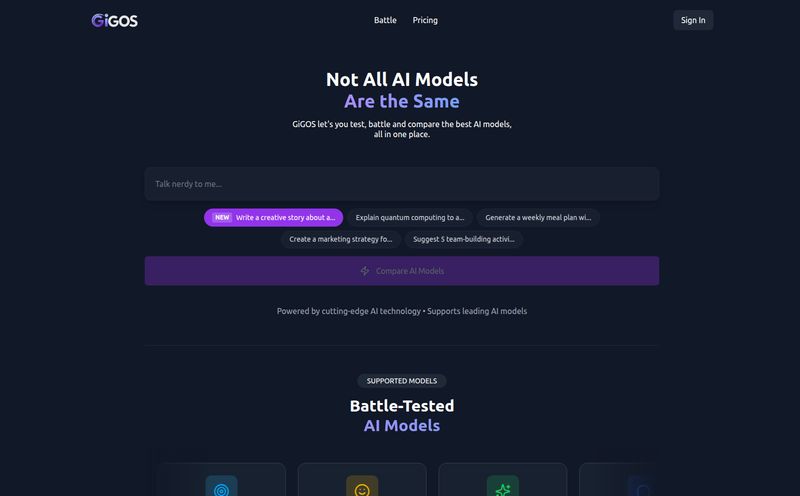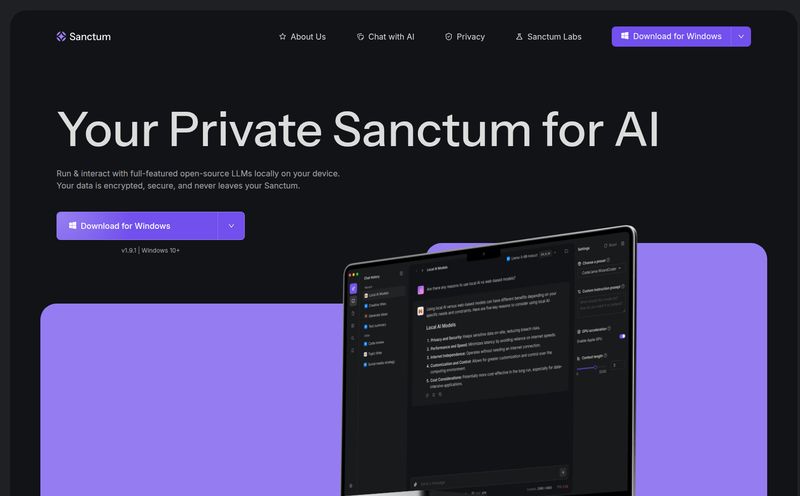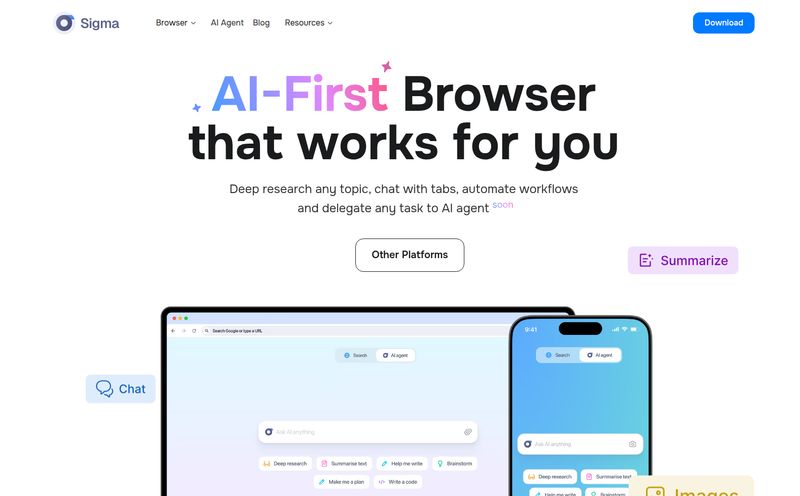It was 2 AM. I was staring at a Google Doc, the cursor blinking mockingly, as I tried to figure out the right angle for a new client’s content strategy. I didn’t need a full-blown consultant, not really. I just needed a sounding board. Someone to throw a half-baked idea at without getting a weird look. You know the feeling, right? That little gap where you need a specific kind of feedback, but everyone you know is, well, asleep.
Lately, it feels like a new AI tool is born every ten seconds. The market is absolutely saturated with chatbots, AI writers, and image generators. Most are just thin wrappers over the same handful of large language models. So when I heard about a platform called Clones AI, my first thought was, naturally, “Oh great, another one.” But then I looked a little closer, and my skepticism started to get a little… wobbly.
So, What Exactly is Clones AI?
Here’s the hook that got me. Clones isn't trying to be a single, all-knowing oracle. Instead, it’s more like a digital repertory theatre. It offers a whole cast of AI personalities, each one “trained” or designed for a specific type of conversation. Think of it less like a single search engine and more like a speed-dial list for different kinds of brains.
You’re not just talking to “an AI.” You’re choosing to talk to an AI therapist. Or an AI lawyer. Or even just an AI friend. This isn’t about getting a generic, Wikipedia-style answer. The entire premise is built on personalized, engaging dialogue that fits the context of who you’re supposed to be talking to. It’s a fascinating pivot from the one-size-fits-all approach we see everywhere else.
The Cast of Characters: Who Are You Talking To?
This is where it gets interesting, and frankly, a little weird. The idea of having specialized AI personas on tap feels like something straight out of a sci-fi novel. Let's break down the potential.
The AI Therapist in Your Pocket
Let's get this out of the way immediately: This is not, and should not be, a replacement for a licensed human therapist. Seriously. Mental health is complex, and no algorithm can replace genuine human connection and professional training. Okay, disclaimer over.
With that said, I can see the appeal. What about those moments of mild anxiety before a presentation? Or just needing to vent about a frustrating day at work without burdening a friend? An AI therapist could be a fantastic tool for low-stakes emotional processing and self-reflection. A judgment-free zone to organize your thoughts. It’s a compelling idea, as long as everyone remembers its limitations.
Getting "Legal-ish" Advice from an AI Lawyer
Again, huge asterisk here. You wouldn’t want an AI defending you in court. But how many times have you stared at a freelance contract or an apartment lease, completely baffled by the legalese? I’ve been there. Having an AI that can break down complex clauses into plain English or help you formulate the right questions to ask a real lawyer… that’s genuinely useful. It could democratize a basic understanding of legal documents, which is a pretty cool mission if you ask me.

Visit Clones
A Friend on Demand
This one gives me pause, but I’m also intrigued. We're all more connected than ever, yet studies constantly point to a growing epidemic of loneliness. Could an AI friend help? Maybe. It could be a space to practice social skills, a companion for someone who is isolated, or just a fun way to chat about a niche hobby. The effectiveness will hinge entirely on how personal and non-robotic these conversations feel. It has to avoid that uncanny valley where it feels almost real, which can be more off-putting than a simple bot.
The Good, The Bad, and The AI
No tool is perfect, especially not in the wild west of modern AI. My years in SEO have taught me to look at the traffic potential and the potential pitfalls.
The biggest pro is the sheer convenience and specificity. Need to practice a sales pitch? Maybe there's an AI CEO clone. Want to brainstorm story ideas? Perhaps an AI creative writer. It’s like a Swiss Army knife for cognitive tasks. The potential to improve skills and get instant, specialized feedback is immense.
But then there are the cons. And they're big ones. The quality of the advice is entirely dependent on the quality of the AI model. If the model is poorly trained, you could get advice that’s not just unhelpful but actively harmful. And then there's teh privacy issue. This, for me, is the elephant in the room. Are you comfortable sharing your deepest anxieties or confidential business ideas with this platform? We need to know a lot more about their data handling policies. This isn’t just about browsing history; it’s about the most personal parts of our lives.
What's the Price of a Digital Soul?
This is the million-dollar question, isn't it? As of writing this, Clones AI has not published its pricing information. This isn’t uncommon for a platform in its early stages, but it's something to keep an eye on.
I could see it going a few ways. A freemium model with a few basic clones and limited chats seems likely. Or perhaps a monthly subscription for unlimited access to the entire cast. Maybe even a pay-per-conversation model for the more specialized AIs like the lawyer. Without a price tag, it’s hard to fully judge its value proposition, but the concept alone is generating buzz.
Who is Clones AI Actually For?
So, who should be rushing to try this out? I think the ideal user is someone who is deeply curious and professionally creative. The writer with block, the developer stuck on a problem, the marketer looking for a new angle. It’s for people who see AI not as a cheat code, but as a novel tool for thought—a collaborator.
It’s probably not for someone seeking definitive, high-stakes professional advice. Use it as a starting point, a simulator, a sounding board. But for the love of all that is good, hire a human for the big stuff.
I find myself circling back to that 2 AM problem. Would I have fired up an AI “SEO Strategist” clone to bounce my ideas off of? Honestly, yeah, I probably would have. The potential is there. Clones AI feels less like just another chatbot and more like a statement about the future of human-AI interaction—a future that is more specialized, more personal, and a whole lot stranger.
Frequently Asked Questions
- What is Clones AI?
- Clones AI is an AI platform that allows you to interact with a variety of different AI personalities, each designed for specific types of conversations, such as a therapist, a lawyer, or a friend, to provide personalized advice and dialogue.
- Is it safe to share personal information with Clones AI?
- This is a significant concern. The safety of your data depends on the platform's privacy policy and data security measures. As with any AI service that handles personal information, you should exercise caution and understand how your data is being stored and used before sharing sensitive details.
- Can Clones AI replace a real therapist or lawyer?
- Absolutely not. The platform should be viewed as a supplementary tool for informational or supportive purposes only. It is not a substitute for professional, licensed human experts in fields like mental health and law.
- How much does Clones AI cost?
- Currently, pricing information for Clones AI has not been released. Potential models could include freemium, subscription, or pay-per-use structures, but this is speculative.
- What makes Clones different from other chatbots like ChatGPT?
- The main difference is its focus on specialized personalities. Instead of a single, generalist AI, Clones offers a roster of distinct AIs tailored for specific conversational roles, aiming for more contextual and nuanced interactions.
- Can I create my own AI clone on the platform?
- While the core offering focuses on pre-built personalities, the name "Clones" certainly suggests that creating or customizing your own AI personalities could be a future possibility, though this has not been confirmed by the company.
Reference and Sources
- On the rise of AI Companions: The new, more human-like AI chatbots from The Verge
- On the ethics of AI in mental health: Trends in AI mental health apps from the American Psychological Association



